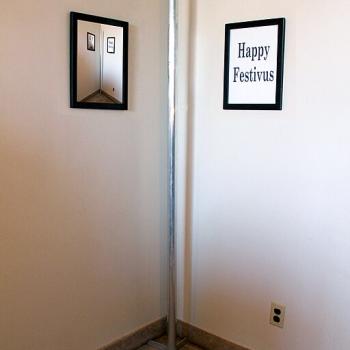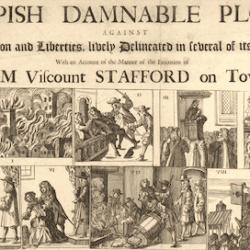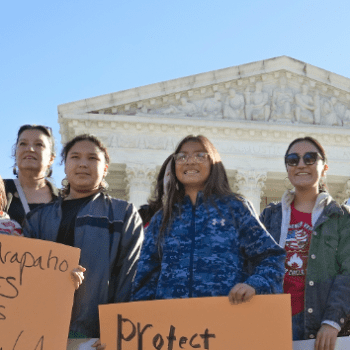This semester, I’m teaching an introductory course on “Religions of the West.” My initial hope was that the crafters of the curriculum meant the American West. I figured I could spend half the course on Mormonism, complementing that with units on native religions, Mexican-American Catholicism, and the development of eastern religions on the West Coast. Turns out that the title meant Judaism, Christianity, and Islam. Fortunately, teaching is a great motivation for learning.
In other ways, I found the course title problematic. It’s no longer accurate to categorize Christianity as a “Religion of the West,” and it was the most Western of the three to begin with. How about “People of the Book” or “Children of Abraham” ?
For our first full day of class, I asked my students to read Rita Gross’s essay “Religious Diversity: Some Implications for Monotheism.” It’s a provocative piece that asserts that in today’s world, universalizing and exclusivist forms of monotheism (namely, Christianity and Islam) are inappropriate and dangerous. I found that starting point rather dubious. To quote from a recent article by Patrick Mason in the Journal of Mormon History (no online link available; it’s the Summer 2012 issue): “The fact is that, not religion, but rather the state, with its various historical antecedents and correlates, is far and away the greatest purveyor of violence in world history and never more so than in the past century.” To be fair, Gross doesn’t specifically suggest that monotheism is to blame for the world’s violence, but she does contend that monotheism is “at least partially responsible for many of the numerous conflicts currently disrupting our world.” I think Mason is correct to shift the blame from religious belief per se to the ways that states utilize various ideologies (sometimes religious) to oppress and kill people.
Gross calls for what she terms “genuine religious pluralism,” differentiated from attempts to finesse the issue by speaking of “multiple covenants” or “anonymous Christians.” I think she is correct that such half-steps obscure real differences between religious systems and limit mutual appreciation (and critique). For her, true pluralism means that “without trying to create a single religious system out of the plurality of world religions, it becomes possible to be inspired by other religions, to the point that one welcomes and fosters mutual transformation, taking on aspects of other religions that are lacking or weak in one’s own.” She continues later: “once one understands other religions on their own terms, it is difficult not to appreciate them. They are so fascinating, so coherent internally, so rich, and usually, so compelling.” Furthermore, she suggests that “this kind of attraction is not threatening because one realizes that appreciation does not demand personal faith commitment to what one appreciates.”
The piece worked well for an introductory discussion, partly because my students were rather divided about Gross’s conclusions. Many agreed that her prescription was a necessary antidote to intolerance and divisiveness. Others, though, paused. Is it tolerant and appreciative to ask monotheists to be, well, less monotheistic? Or to ask religions with universal aspirations to give those up? It’s hard to imagine Christianity being Christianity without, say, the Great Commission.
A few other thoughts:
1) I am fully on board with understanding religions on their own terms and finding things to appreciate. I’ve blogged repeatedly about my experiences with the Church of Jesus Christ of Latter-day Saints. It has not been difficult to find things to appreciate. If only Presbyterians would help fellow Presbyterians unload their belongings when they move to a new area! Family Home Evening, jobs for everyone in the congregation, relief funds for struggling members of the congregation, etc. It also wasn’t hard for me to appreciate the Mormon regard for scripture or the internal logic of Joseph Smith’s later theology.
2) However, the sort of religious pluralism Gross proposes is more threatening to both individual and collective faith than she admits. While there are many reasons for their relative decline, the denominations and churches that have come closest to embracing genuine religious pluralism aren’t exactly booming. That doesn’t say anything about the ethics of religious pluralism, but it casts its pragmatism in doubt.
3) I’m not certain that most individuals, even if they seek to understand other religions on their own terms, will necessarily find most religious systems compelling and beautiful. Other reactions may be just as common.
4) Genuine religious pluralism and true toleration would mean that various universalizing monotheists, other religions, and atheists could get along while retaining their differences, including evangelistic imperatives (which certain secuarlists also share).












